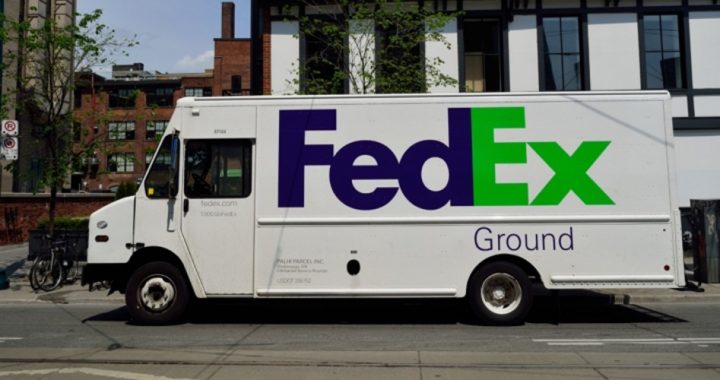
After reviewing various publicly available sources, three New York Times staff writers discovered that FedEx Corporation paid no income taxes in 2018. They also discovered that FedEx didn’t use the estimated $1.6 billion it saved in taxes to increase its investment in new equipment, reneging on an implied promise FedEx’s founder, Fred Smith, made when lobbying for Trump’s Tax Cut and Jobs Act.
This was perfect fodder to promote the Times’ anti-capitalist ideology that FedEx, and by extension all capitalists, are greedy selfish liars. The paper made its case in a front-page article published on Sunday.
The three Times staffers made clear their ideology, noting in the article’s opening that “the company, like much of corporate America, has not made good on its promised investment surge from President Trump’s 2017 tax cuts.” They noted:
In the 2017 fiscal year, FedEx owed more than $1.5 billion in taxes. The next year, it owed nothing….
FedEx reaped big savings … but it did not increase investment in new equipment and other assets in [2018] as Mr. Smith said businesses like his would.
Instead, the company used “much of its [tax] savings … to reward shareholders: FedEx spent more than $2 billion on stock buybacks and dividend increases in the 2019 fiscal year, up from $1.6 billion in 2018, and more than double the amount the company spent on buybacks and dividends in fiscal year 2017.”
The staffers extended their accusations from FedEx to capitalists in general: “From the first quarter of 2018, when the [tax] law took effect, companies have spent nearly three times as much on additional dividends and stock buybacks, which boost a company’s stock price and market value, than on increased investment.”
This aroused the ire of Smith, who issued a statement later that day calling the article a calumny and challenging the Times’ editor, A.G. Sulzberger, to a public debate. Said Smith:
The New York Times published a distorted and factually incorrect story on the front page of the Sunday, November 17 edition concerning FedEx and our billions of dollars of tax payments and billions of dollars of investments in the U.S. economy.
Pertinent to this outrageous distortion of the truth is the fact that unlike FedEx, the New York Times paid zero federal income tax in 2017 on earnings of $111 million, and only $30 million in 2018 — 18% of their pretax book income.
Also in 2018 the New York Times cut their capital investments nearly in half to $57 million, which equates to a rounding error when compared to the $6 billion of capital that FedEx invested in the U.S. economy during that same year.
Likely knowing that comparing the income and financial statements of FedEx versus the Times would be considered somehow unfair (FedEx’s revenue in 2018 was $65 billion versus the Times’ revenue of less than $2 billion), Smith preferred to challenge the Times over its ideology behind the article:
I hereby challenge A.G. Sulzberger, publisher of the New York Times and the business section editor to a public debate in Washington, DC with me and the FedEx corporate vice president of tax.
The focus of the debate should be federal tax policy and the relative societal benefits of business investments and the enormous intended benefits to the United States economy, especially [for] lower and middle class wage earners.
In that theoretical debate, Smith would no doubt review his company’s history from its founding in 1971 to an international behemoth delivery company employing more than 425,000 people worldwide. He’s likely then to note that the company increased its workforce by about four percent in 2018 and another seven percent so far this year. He’s also likely to tell the Times’ publisher that his company accelerated previously scheduled wage increases for his hourly employees while giving performance-based pay increases to his managers. He would remind the publisher that his company has committed to investing $1.5 billion in its Indianapolis shipping hub, and has just purchased 24 Boeing freight delivery jets for $6.6 billion, none of which would have happened without those tax cuts. He’ll also remind Sulzberger that his company sweetened its additions to his employees’ pension fund, thanks to Trump’s tax law that made such additions tax deductible.
Smith would gleefully point out that, in contrast, the Times has been struggling financially for years as its subscriber base has shifted away from print to digital formats, resulting in a continuing decline in its advertising revenues.
What’s unfortunate is that that debate won’t be taking place. Danielle Rhoades Ha, the Times’ vice president of communications, called Smith’s challenge “clearly a stunt,” adding that “FedEx’s colorful response does not actually challenge a single fact in our story. We’re confident in the accuracy of our reporting.”
As for any debate over the Times’ anti-capitalist ideology, that will never happen because it’s a debate the Gray Lady and her staffers would lose.
Image: Raysonho / Wikimedia Commons
An Ivy League graduate and former investment advisor, Bob is a regular contributor to The New American, writing primarily on economics and politics. He can be reached at [email protected].
Related article:



